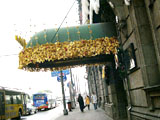Shanghai ClimateWith a pleasant northern subtropical climate, Shanghai enjoys four distinct seasons with generous sunshine and abundant rainfall every year.

Spring starts in March in Shanghai. The weather in spring, although considered the most beautiful season, is highly variable, with frequent rain and alternating spells of warm and cold. During the spring season, people wear long jeans, shirts, light sweaters, jackets, and so on while the weather is still cool.
 Summer, starting in June, is the peak tourist season, but is
hot and oppressive, as the humidity makes it difficult for people
unfamiliar with the environment to breathe properly. Clothes
tend to get fairly wet after minutes of walking. Heavy rain is
frequent in early summer along with temperatures reaching an
average of 32 degrees Celsius (90 degrees Fahrenheit) during
the hottest months of July and August.
Summer, starting in June, is the peak tourist season, but is
hot and oppressive, as the humidity makes it difficult for people
unfamiliar with the environment to breathe properly. Clothes
tend to get fairly wet after minutes of walking. Heavy rain is
frequent in early summer along with temperatures reaching an
average of 32 degrees Celsius (90 degrees Fahrenheit) during
the hottest months of July and August.

Autumn, starting in September, is generally sunny and dry and a popular time of the year for tourists to visit, even though the foliage season is in November. During the autumn season, people start to wear long jeans, shirts, light sweaters, jackets, and so on to protect themselves from the sea breeze.

Winter, starting in December, is typically grey and dreary, with little or no snowfall. Due to the city's closeness to the sea, the city may experience freezing temperatures during the winter season, where it is cold enough that you will often see people wearing down jackets and thermal underwear.
Shanghai has a few Typhoon spells during the year, none of which in recent years have caused considerable damage. Spring and autumn in Shanghai are relatively short compared with its summer and winter seasons. In Shanghai, nearly 50% of the precipitation comes during the May through September flood season, which is divided into three rainy periods: the spring rains, the plum rains and the autumn rains. Spring and autumn, with moderate temperatures, are the best times to visit Shanghai.
Detailed information about the average temperatures and rainfall in Shanghai are as follows:
|
|||||||||||||||||||||||||||||||||||||||||||||||||||||||||||||||||||||||||||||||||||||||||||||||||||||||||||||||


